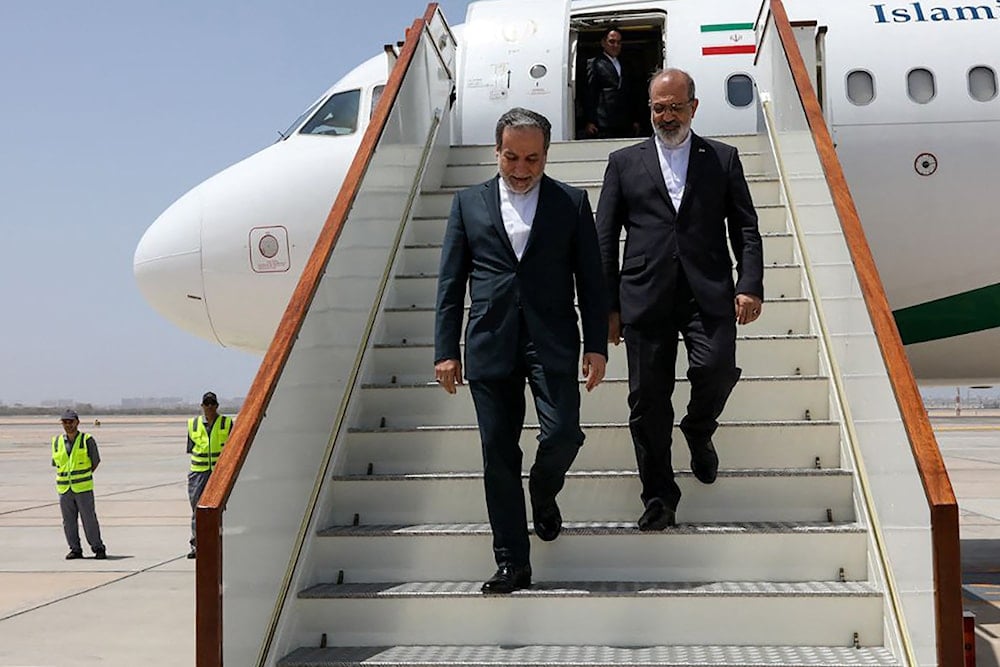Iran warns of irreversible tensions if Europe triggers JCPOA snapback
With the JCPOA snapback deadline approaching in October, Iran’s FM warns European nations that reimposing UN sanctions could escalate tensions beyond repair.
-

This handout picture provided by the Iranian Foreign Ministry on May 11, 2025, shows Iran's Foreign Minister Abbas Araghchi (L) descending the stairs of an aircraft upon his arrival in Muscat. (Iranian Foreign Ministry/AFP)
Iranian Foreign Minister Abbas Araghchi has issued a strong warning against any misuse of the JCPOA snapback mechanism, saying such an action would not only eliminate Europe’s role in the nuclear deal but could also push tensions to an irreversible level.
The snapback mechanism is a provision within the 2015 Joint Comprehensive Plan of Action (JCPOA), commonly known as the Iranian nuclear deal. It allows any participant state to unilaterally reimpose United Nations sanctions on Iran if it is determined that Tehran is significantly non-compliant with the terms of the agreement.
European governments are considering triggering the JCPOA snapback mechanism, which would reinstate UN sanctions against Iran. The option expires in October, adding urgency to the ongoing nuclear talks between Iran and the United States.
In a statement posted on X, Araghchi said, “We have officially warned all JCPOA signatories that any misuse of the snapback mechanism would lead to consequences—not only ending Europe’s role in the deal, but potentially escalating tensions to a point of no return.”
L'Iran a clairement fait connaître sa position. Nous avons officiellement averti tous les signataires du JCPOA qu'un abus du mécanisme de « snapback » entraînera des conséquences – non seulement la fin du rôle de l'Europe dans l'accord, mais aussi à une escalade des tensions…
— Seyed Abbas Araghchi (@araghchi) May 11, 2025
Iran-E3 relations at a critical juncture
Referring to the three European signatories to the deal, France, Germany, and the United Kingdom, Araghchi said, “The three European countries (E3) must ask themselves how the situation has reached such a deadlock.”
The warning follows renewed diplomatic efforts by Tehran aimed at salvaging relations with Europe.
“Following recent consultations with Russia and China, I expressed my readiness to travel to Paris, Berlin, and London to open a new chapter in relations,” Araghchi said.
He noted that this initiative had already prompted preliminary talks at the level of deputy foreign ministers, describing them as “fragile, yet promising.”
Iran calls for urgent diplomatic action
Araghchi emphasized the urgency of the moment, stating, “Time is running fast.” He stressed, “How we respond to this critical moment will shape the future of Iran-Europe relations more deeply than many expect. Iran is ready to turn the page. We hope our European partners have the same will.”
Iran-US conclude fourth round of indirect nuclear talks
The Iranian Foreign Minister's remarks came after Iran and the US concluded a new round of nuclear talks in Oman on Sunday with no breakthrough on the core issue of uranium enrichment.
However, both sides agreed to continue discussions in the near future.
This marked the fourth round of Iran-US nuclear talks in Oman within a month, and the highest-level contact since Washington withdrew from the 2015 nuclear deal, JCPOA, during President Donald Trump’s first term in 2018.
Iran reaffirms enrichment as 'non-negotiable'
Araghchi, who led the Iranian delegation, reiterated Tehran’s firm position on uranium enrichment, saying it "must continue and there is no room for compromise on it."
However, he told Iranian state TV that Iran may be open to limiting the rate of enrichment to “help build trust,” suggesting a possible opening for future diplomatic compromise.
Iran currently enriches uranium to 60%, well above the 3.67% limit set under the JCPOA, though still below weapons-grade levels of 90%.
Iranian Foreign Ministry spokesperson Esmaeil Baqaei said on X that Oman would coordinate and announce the timing of the next round. Oman confirmed it would schedule future talks after both sides consult their leadership.
Read more: Iran reaffirms to UN chief Guterres right to uranium enrichment
Witkoff’s 'red line' on enrichment draws Iranian rejection
Steve Witkoff, Trump’s Middle East envoy and the US chief negotiator, had earlier declared uranium enrichment by Iran a “red line,” telling Breitbart News that Iran’s "enrichment facilities have to be dismantled.”
Iranian President Masoud Pezeshkian rejected these demands on Sunday, saying, “Iran will not give up its peaceful nuclear rights under any circumstances and will not back down from its rights in the face of pressure.”
Tehran maintained compliance with the nuclear deal for a year after Washington’s exit, before gradually scaling back commitments. Since returning to office in January, Trump has revived his “maximum pressure” strategy against Iran, while maintaining diplomatic outreach alongside warnings of possible military action.
Read more: Talks with US show signs of progress, next round in a week: Iran FM

 4 Min Read
4 Min Read









